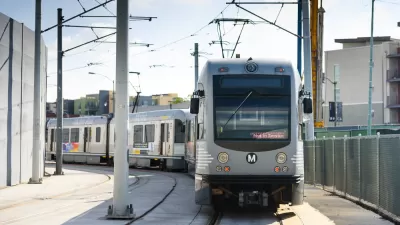YIMBYs don't understand poverty, claimed one social justice group. Few, if any, connections with equity groups and too many with tech companies may have helped doom SB 827's chances of making it to first base in the legislature this year.

The adversarial role played by social justice and other equity advocacy groups helped contribute to the early defeat of Senate Bill 827 on April 17, a bill which would have aggressively tackled California's housing shortage by allowing multifamily housing by rail and ferry stations and frequent bus stops, while relaxing height, density, and parking restrictions.
In this post-mortem on the bill, Liam Dillon, who covers California state politics and policy for the Los Angeles Times, explains how Sen. Scott Wiener's bill not only lost the support of those who arguably stood the most to gain from it, but became among the bill's staunchest opponents. [See April 24 post-mortem on SB 827 by Dillon and CALmatters’ Matt Levin.]
The bill's sponsor, California YIMBY, as well as 22 academicians in the urban planning field from California universities (see March 19 letter [pdf]), saw the bill as a legitimate means to tackle the state's housing crisis by increasing housing production, often stymied at the local level by restrictive zoning codes.
Research from the state's nonpartisan Legislative Analyst's Office and UC Berkeley [pdf] has found that building any new housing, especially homes subsidized for low-income residents, prevents displacement at a regional level. But the data are less clear on the effects of construction in individual neighborhoods, sparking concerns that relaxed zoning rules could cause development that would price out residents in poor communities.
Equity advocates, including social justice, affordable housing, and tenants' rights groups, saw the bill differently, "and instead worr[ied] that developers would build housing catering only to wealthier, white residents, leading to higher prices that would force out those living in poorer communities now," writes Dillon on May 2.
This divide was one of the primary reasons for the failure last month of Senate Bill 827, which would have allowed for the construction of four- or five-story apartment and condominium buildings within half a mile of transit stops.
Activists for low-income residents and communities of color said that they were blindsided by state Sen. Scott Wiener's proposal and that subsequent efforts [see descriptions of March 1 and April 9 amendments] by the senator to protect against potential displacement and gentrification were inadequate.
Wiener (D-San Francisco) saw his bill as a means to tackle two of the most significant problems facing the state: housing and climate change. While he knew that local governments would be opposed to the loss of any land use authority, it doesn't appear that neither he nor Brian Hanlon, California YIMBY's executive director, foresaw the opposition by the equity groups. Hanlon "planned on addressing their issues as SB 827 moved through the Legislature," adds Dillon.
"We need to be involved from the beginning," said Laura Raymond, campaign director for Alliance for Community Transit-Los Angeles. "We need equity to be the aim of the bill, not an afterthought."
Too cozy with tech companies?
The close association, in terms of financial backing and YIMBY members themselves, with technology companies, also may have contributed to the divide. [See Planetizen: "The One Tech Company That's Engaging In California's Housing Debate," May 3]
One of California YIMBY's first shows of support for SB 827 was a letter from more than 120 tech company executives, who are some of its biggest funders and often serve as lightning rods in the state's gentrification debates.
Tech executives said the state’s housing crisis makes it hard to recruit and retain employees and is pushing tech firms to relocate out of the state.
Members of YIMBY groups are often perceived to be well-paid millennials employed by technology companies. Perhaps a harbinger of the divide could have been the demonstrations in San Francisco and Oakland around tech shuttles, the oversized buses that are seen as disruptive in neighborhoods and also a symbol of gentrification.
"The YIMBY movement has a white privilege problem," said Anya Lawler, a lobbyist with the Western Center on Law & Poverty, a legal advocacy group and adversary of SB 827. "I don't think they recognize it.
Round Two: 2019
Wiener and his allies have acknowledged they need to build better relationships with advocates for poor Californians and vowed to introduce a new bill in 2019. But for now, there is a fundamental disconnect between the approach of the senator and his supporters on one side and influential anti-poverty organizations on the other.
Related reading from The Planning Report via Planetizen on the divide between the backers of SB 827 and equity groups: "Squaring Urbanism, Equity, and Density in the SB 827 Debate," April 12, 2018.

Planetizen Federal Action Tracker
A weekly monitor of how Trump’s orders and actions are impacting planners and planning in America.

Chicago’s Ghost Rails
Just beneath the surface of the modern city lie the remnants of its expansive early 20th-century streetcar system.

San Antonio and Austin are Fusing Into one Massive Megaregion
The region spanning the two central Texas cities is growing fast, posing challenges for local infrastructure and water supplies.

Since Zion's Shuttles Went Electric “The Smog is Gone”
Visitors to Zion National Park can enjoy the canyon via the nation’s first fully electric park shuttle system.

Trump Distributing DOT Safety Funds at 1/10 Rate of Biden
Funds for Safe Streets and other transportation safety and equity programs are being held up by administrative reviews and conflicts with the Trump administration’s priorities.

German Cities Subsidize Taxis for Women Amid Wave of Violence
Free or low-cost taxi rides can help women navigate cities more safely, but critics say the programs don't address the root causes of violence against women.
Urban Design for Planners 1: Software Tools
This six-course series explores essential urban design concepts using open source software and equips planners with the tools they need to participate fully in the urban design process.
Planning for Universal Design
Learn the tools for implementing Universal Design in planning regulations.
planning NEXT
Appalachian Highlands Housing Partners
Mpact (founded as Rail~Volution)
City of Camden Redevelopment Agency
City of Astoria
City of Portland
City of Laramie





























